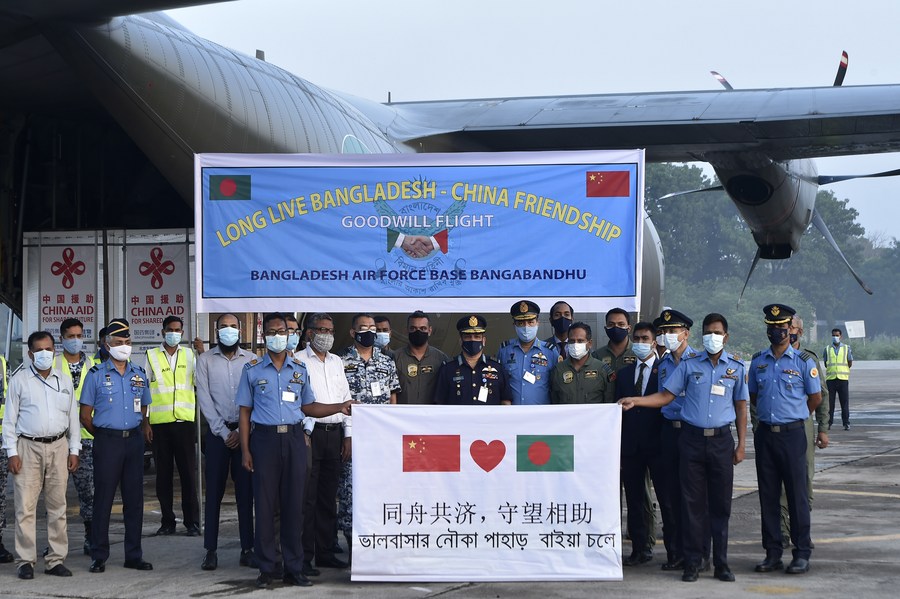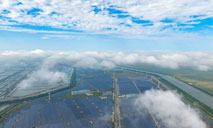Chinese vaccines a safe and affordable option for Bangladesh

Chief of Air Staff of the BAF Masihuzzaman Serniabat and other senior officials pose for photos after receiving the vaccines in Dhaka, Bangladesh on May 12, 2021. (Xinhua)
The coronavirus pandemic continues ripping through many countries around the world. After Europe and the Americas, South Asia has now become its new epicenter. India is now the worst victim of the latest wave of the virus, and other countries in the region are also struggling to get rid of coronavirus with their high infection rates.
In the fight against COVID-19, Bangladesh – with its limited resources – nonetheless went on to achieve remarkable success during the first wave of the virus. The country’s government earned praise from the international community for its initiatives to mitigate impacts from the highly infectious disease.
However, the new wave of the virus has turned the situation upside down in Bangladesh. With the current variants being more deadly than earlier ones, Bangladesh has been faced with a fresh spike in the number of infections and fatalities in recent weeks. As a result, the government has intensified its fight against the virus. It has also widened its international cooperation, and especially with China, in this effort.
Foreign Minister AK Abdul Momen attended a virtual foreign ministers' meeting on April 27 with participants that included China, Bangladesh, Sri Lanka, Nepal, Afghanistan, and Pakistan. Bangladesh approved a proposal for the local manufacturing of the Chinese Sinopharm vaccine. Local companies that intend to collaborate with Chinese pharmaceutical companies will begin co-production of the vaccine as soon as possible.
Bangladesh is also going to join China's initiative to establish a COVID-19 vaccine storage facility for South Asia. All the countries in the region can access doses from the facility for their urgent need without the need for any additional bureaucratic red tape. Bangladesh will plan to purchase vaccines from China since ramping up their production is impossible to achieve overnight.
As far as I know, the Bangladesh embassy in Beijing is trying its best to turn the government's will into action by forging ahead with their country’s cooperation alongside China in the fight against COVID-19. As China has already been flooded with demands for vaccines from around the world, the Bangladesh Ambassador to China, Mahbub Uz Zaman, is now in the process of redoubling his efforts and making the most of his personal connections with Chinese officials to get the vaccines delivered as soon as possible.
As a time-tested friend, China has also responded by extending its helping hand to Bangladesh. Donations of 500,000 doses of the Sinopharm vaccine have already been handed over to Bangladesh. The Bangladesh government has expressed its gratitude to China for commendable efforts in combating coronavirus and for its unwavering support to various countries around the world, including Bangladesh, in efforts to prevent renewed global outbreaks.
Both the Chinese and the Bangladesh governments have been trying their best to do their part to save the people of Bangladesh from the devastating pandemic. The Bangladeshi people are also grateful to the Chinese and have firm confidence in Chinese vaccines.
But unfortunately, some media outlets are still running half-true and untrue stories targeting the Made-in-China vaccines. These stories are nothing but tools of propaganda circulated around just to smear China and people will never buy them. Now the world knows that the Sinopharm COVID-19 vaccine has been listed by the World Health Organization (WHO) alongside others as a COVID-19 vaccine for emergency use, which has provided a green light for the global administration of this vaccine.
Everybody knows that Chinese vaccines have been proven to protect people against COVID-19 in a safe, effective, and affordable way. Many countries have so far granted market approval or emergency use for two Chinese vaccines. As a result, China's vaccine producers have been required to plan and increase their production capacity and contribute to vaccine accessibility and affordability in developing countries.
Chinese vaccines adopt a more traditional method that has successfully been used to develop many well-known vaccines, such as rabies, over the years. One of the main advantages of Chinese vaccines is that they can be stored in a standard refrigerator at 2-8 degrees Celsius, while Moderna's vaccine needs to be stored at -20C and Pfizer's vaccine at -70C. This means that Chinese vaccines can be more readily adopted for use in Bangladesh and other developing countries, many of which may not be able to store large amounts of vaccines at such low temperatures.
If we look at the level of efficacy for these vaccines, we can see that the WHO has recently approved the Sinopharm vaccine for emergency use, which is a prerequisite for inclusion in the global vaccine solidarity initiative, also known as COVAX. The WHO has said that the vaccine is easy to store, making it suitable for locations with limited resources, and presented evidence showing that the vaccine achieved a 79 percent effective rate in clinical trials.
“The addition of this vaccine has the potential to rapidly accelerate COVID-19 vaccine access for countries seeking to protect health workers and populations at risk,” said Dr. Mariângela Simão, WHO Assistant-Director General for Access to Health Products, adding that “We urge the manufacturer to participate in the COVAX Facility and contribute to the goal of more equitable vaccine distribution.”
Md Enamul Hassan is a news editor and broadcast journalist at China Media Group (CMG) in Beijing, China.
Photos
Related Stories
- Philippines logs 6,784 new COVID-19 cases, total tally rises to 1,131,467
- Hong Kong reports no new local COVID-19 infection
- Members of Egyptian family celebrate Eid al-Fitr at home amid COVID-19 pandemic
- Nepal's hospitals face acute shortage of oxygen amid rising COVID-19 cases
- Volunteers feed monkeys during COVID-19 lockdown in Indian-controlled Kashmir
Copyright © 2021 People's Daily Online. All Rights Reserved.










